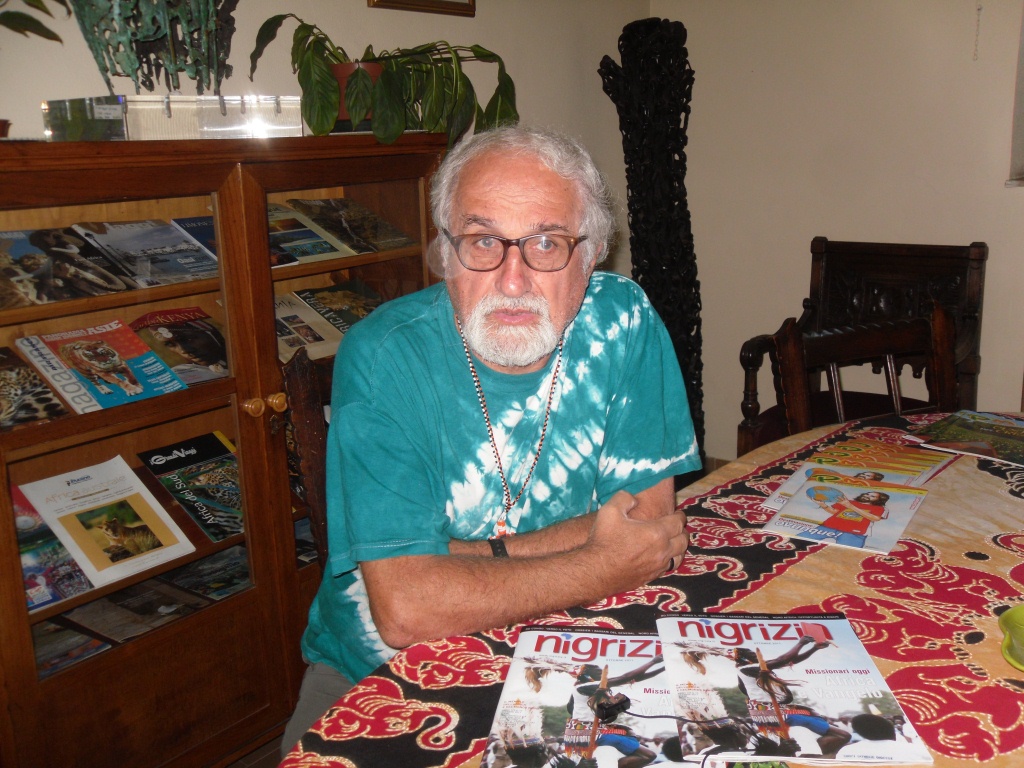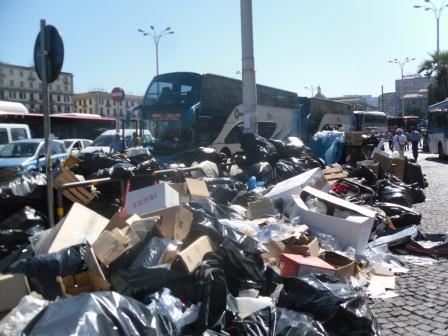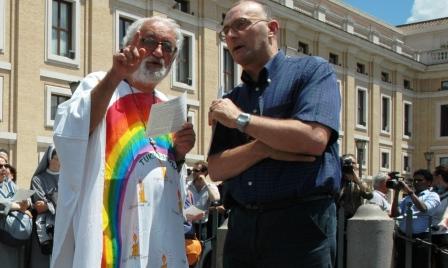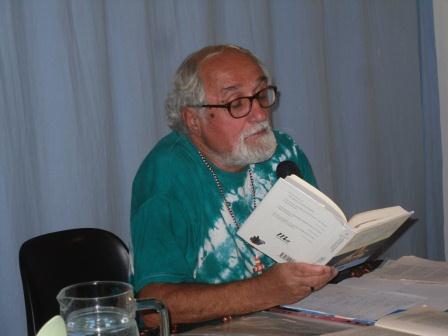Daniel Comboni
Comboni Missionaries
Institutional area
Other links
Newsletter
Rome, Saturday, October 29, 2011
Alex Zanotelli is a Comboni Missionary well known and respected both in Italy and abroad. He has won many battles alongside the poor. He does not dwell on his failures. In fact, he says that they stimulate him to continue his missionary work. He is convinced that here, in the South of the North of the world “we carry on a work of mission promotion, because to promote does not mean to come back from the missions to tell what we do there and collect some money. To remain here stimulates the local churches and is an instrument to generate new missionary vocations for the poorest.” We had a conversation with him on topics that are dear to his heart and that may be of interest to many of us.
To return to my white tribe and convert it
A conversation with Fr. Alex Zanotelli
Why Naples?
It’s a choice. The first choice was to return to the North of the world. After 12 years in Korokocho, I thought it was necessary to get busy in the North of the world in order to help people understand that the political plays of the North of the world cause disasters among the poor.
This was verbalized to me in a very significant way the night I left Korokocho. I left there on April 18, 2002. The night before, the people in charge of the small Christian communities, the pastors of the various churches, including the independent African churches, told me that I could not leave before they had prayed for me. It was a most beautiful prayer that lasted three hours. Towards the end one of them told me: “Alex, kneel down!” I knelt down in their midst. Another one called for the imposition of hands. I had hundreds of hands over my head and a minister of the independent African church, Rev. Timothy, started praying in a charismatic way, a long prayer, where towards the end he said: “Daddy, thank you, because Alex has walked with us for these 12 years. I pray, Daddy, give him your Spirit so that he may return to his white tribe and convert it.”
I think this is the reason why I came out, namely to convert my white tribe which needs conversion so badly, because by its politics it is produces incredible tragedies that cause so much suffering among the poor.
Coming back and having looked around, I have chosen to live in the South, because southern Italy is the area most left to itself and has more problems of all kinds. So I chose the South and in the South a southern city, Naples. At the time people were speaking more of Palermo, because it seemed to have more problems. Instead it was later established that Naples is the southern city that has the most social problems. From this rose the decision to settle down in one of the most problematic neighborhoods of Naples, the center of the city, the Rione Sanità, one of the worst neighborhoods of the city, and place myself in it in the simplest possible manner. I share three rooms with Fr. Domenico, proving that it is possible to live simply and animate people in a fashion that I would call missionary.
Missionary in which manner?
We have made a twofold choice. First: Definitely, we do not have a parish. We chose not to have a parish. But we could not just pretend to belong to Rione Sanità. Here we chose to start with the small communities that read the Gospel. They meet on a weekly basis, they journey together, they build together a community life and are attentive to the reality around them.
Second: we pay attention to local problems. So there arose a special attention to the situation of the children, by way of example. We have great problems related to children, so we gave birth to 5/6 after school programs to help those who have difficulties in school, or problems at home. Once a year, in July, we put together a summer camp for them right here in the Rione Sanità. There are children who have never been to the sea shore, even though we live close by.
To all this we must add attention to the families that have more difficulties. With them we try to practice the micro-credit system. This is not easy, because none of them wants to come out of the “under the table” system. They all work that way, illegally, because if they exit the system, they can’t make financially, they can’t make ends meet.
We even tried to create a network, joining people who work in the same field, so as to have more leverage, to obtain what they want or need. An activity in this direction was the attempt to unite all the organizations of the neighborhood and of the four parishes to make people take to the streets with gloves and brooms to clean up their own neighborhood. These are small steps taken at the local level. But we are also doing something about larger issues: the water, for example. The battle we waged all over Italy started in Naples. The first victory was achieved in Naples in 2006 and immediately we got together to proclaim all over Italy that water is a public good that must be managed by the public. For me this was a great victory because it meant a triumph for the poor in the South of the world. In fact, the South of the world greatly appreciated the referendum that we won on the management of water. Why? If water becomes a commercial commodity, it’s the end; it will be worse than people dying of hunger; there would be twice as many dying of thirst.
In my estimation victories and campaigns of this type must be highlighted and given prominence in the mission promotion of the Comboni Missionaries in Europe.
Backtracking a little, I would like to say that this has not been our only victory. There is the one over the garbage disposal issue, because air is fundamental to ecology and to quality of life. To win means to give hope to the South, to the poor; when we lose, it’s bad news for them.
What difficulties have you found in carrying out your mission?
The difficulties are many and from various fronts. The most difficult front is that of the economic-financial and political structures. In these environments they don’t want to hear of it. It is taboo to speak of new styles of life, of reshaping the style of life, or saying that we can no longer grow in an indiscriminate manner. There is an unbelievable block; same with the problem of the ecology. There absolutely no will to change. It is total absurdity.
The other difficulty is at the ecclesial level. And here the problem is twofold. My impression is that in the Church of Europe and of the North of the world there is no connection between faith and life. On certain topics we hear it said: “Forget it. This is politic, this is economy, this is ecology. What does it have to do with us?” For this reason we are not present in situations that interest everybody. On the contrary, at times they point an accusing finger as if to say: “You are involved in the economy, you are involved in politics, you are involved in sociology.”
For me it isn’t so and I give you an example: on the question of water, it was so clear that it was a moral, ethical, deeply spiritual problem that involved my faith. But in my opinion, the Church, and I speak of the Western world, has embraced the system; it feels at home there. Therefore it cannot understand the seriousness of the problems. I speak in general terms, because there are also bishops and good and intelligent priests who understand and are busy transforming reality.
Another huge obstacle I have found is the ignorance of citizens at the grassroots. Ignorance and powerlessness. Ignorance, because the media do not pass on certain things. The consequence is that people share a deep feeling of powerlessness. They say: “Nothing can be done. What could we possibly do?”
Hence the importance of uniting and networking. The water question was a great lesson, because we have seen that starting from the grassroots we can obtain extraordinary results if we become aware, if we unite; if we get organized we can achieve many things.
If the problems of Naples are so serious, could it be true to say that little can be done towards a solution?
Problems such as the “camorra”, the garbage, the violence are not exclusively found in Naples. In Naples I would say that the “camorra” has won hands down, just like the “ndrangheta” in Calabria and like the “Mafia” in Sicily. We are practically in their hands, because they have penetrated everywhere. And today they are pervading the entire country. The “ndrangheta” has penetrated Milan to a terrible degree. It’s a scary thing.
For this reason, our position is that, rather than have a confrontation with the mafia, we choose to take grounds from under the feet of the camorra through initiatives from the grassroots. Micro-credit is a good example. In our Rione Sanità this undermines the camorra, because it is the one that gives money to the families. I repeat: the problem is huge and it is something we need to face at the level of Church.
Unfortunately, this is not happening. I believe that in the South they should forbid all processions and feasts of the saints, because very often they are connected to organized crime. It is not easy to help the Church understand that even though they are part of popular religiosity and of daily life, they cannot be accepted.
And, as I was saying, the mafias are not a southern problem only; they penetrated the North as well. Thanks to globalization they have already established a foothold in the great capitals; they are the ones that manage the financial world. Therefore this is truly a fundamental front. It is not enough to take part in protest marches, it is necessary to take away grounds from under them and their very reason of being, so that the mafias will crumble from within. It is not easy because they are very powerful.
The mafia has worked a lot on some fronts such as the ones of toxic waste and ordinary garbage. This is something we worked very hard to expose in Campania to establish that it was not a problem of normal garbage. The real problem was toxic waste, because up to 20 years ago, up to the 90s, Italy was exporting toxic waste to Somalia.
We - at the time I was the editor of Nigrizia - had already exposed the weapons deal, but we did not know one thing: behind the sale of weapons there was an agreement between the government of Somalia and the government of Italy: Somalia was receiving toxic waste from Italy and burying it in its beaches and Italy was giving weapons to Somalia. This was the deal. When Mohamed Siad Barre fell, it became impossible to take toxic waste to Somalia, so the deal was made with the camorra.
The industry of the North signed a deal with the camorra to bury toxic waste in Campania. The camorra has buried a lot of stuff over the past 20 years. Especially in the Death Triangle which is Acerra, Nola, Mariliano. Triangle of Death because people are dying of cancer and leukemia. Also the area North of Naples, Quagliano, Giuliano, is full of toxic waste, the entire strip of the Litorale Domiziano is a disaster. And then many tons of waste have been buried by the clan of the Casalesi, for example, in the port of Marghera.
This waste produces dioxins that attack especially pregnant women and newborn babies. This has been the first major activity of the camorra, where it has drawn huge profits.
The second, and this was not supposed to be exposed, the Camorra has profited greatly on the regular garbage disposal. The camorra has penetrated deeply the local politics. It has managed this traffic very well. What happened? This is important in order to understand the type of missionary activity we are engaged in. From 96 up to today there has been the so called ecological crisis of Campania. This crisis has been managed during this entire period by 10 extraordinary commissioners, chosen by the government. During these years there have been four center-right governments and four center-left governments. It means that they are both guilty. What did these ten commissioners do? They simply obeyed those who imposed the incinerators and the mega-dumps. Here is the tragedy that took place. What did they do? In a period of 16 years there has not been even one place for compost, to separate wet from dry garbage. Then they started to package garbage, the famous “ecospheres” wrapped in cellophane placed in Giuliano. They kept eight millions while waiting for the construction of the incinerator of Acerra. But it took eight years. They were left behind waiting to be burned because it is in the burning process that money is made.
The reason for the profit is this: 1st. To build an incinerator costs a lot of money (250-350 Euro each), 2nd. Burning produces electricity which is sold to ENEL, 3rd. each family pays more than 7% of its bill that should go to renewable energy which instead goes to the incinerators. With this tax the government doles out 3-5 billion a year that go to the people who run the incinerators. That’s why they want to incinerate.
All this has brought us to the tragedy of 2008: we were buried by garbage. Thus Naples became sadly famous in the world as the city buried under garbage. But it is clear because there was never a high level policy. Simply they got everything ready for burning. Then comes Berlusconi’s decree imposing to Campania four incinerators and 12 mega-dumps. If the four incinerators will ever be built (so far only the one in Acerra has been built), we in Campania will have to buy garbage, because we won’t have enough. And this was imposed with the presence of the army.
We rebelled against all this and everywhere we organized at the grassroots in order to be present, to protest and to form citizens committees. People have done all sorts of things to show what was happening. All this according to the principle that, just as access to water is a fundamental right, so is air. This is the struggle we are involved in at present.
The struggle has now been taken up by De Magistris, the new mayor, who says: enough with the incinerators and the mega-dumps; we must reach 70% garbage differentiation. A good 40% of wet garbage must return to agriculture and the dry 30% to industry. Then we must begin to produce less garbage, necessitating new life styles and the elimination of certain things (packaging, plastic bags, plastic bottles for mineral water).
It is in this spirit that we have worked and therefore this becomes a deeply missionary activity. I already have experienced it in Korokocho. So my experience started there and in Naples, where I see a similar situation, I have tried to duplicate it.
What signs of hope do you see in such a serious situation?
Hope comes from the fact that when we get organized and make people understand the importance of working together, extraordinary things happen. We had already won a first battle in 2006 in Naples: we obtained that water not be privatized even though it had already been decided by 150 municipalities. We said no and were able to turn the situation upside down and all the 150 municipalities voted for public water.
Hope is born from this, and the same goes for the garbage. The mayor of Naples, De Magistris, has taken up the fight that we were already carrying on from the grassroots. I am convinced that, if he can find the money, De Magistris will make it. A few days ago I went to city hall to greet a great friend, Paul Comet, the president of the network Zero-waste. Now Naples is part of this network. The journey already done shows you that things do happen.
At times don’t you fell like saying with Jonas: That’s enough?
No, no, the opposite. Because I see that with very little you can do a lot. The important thing is to get involved. The victory of the water issue has given us a great push forward, because it was a victory of poverty against the powers. We were abandoned even by the parties.
And then, to live here among the people is a unique experience. The Neapolitans have been for a long time squashed and oppressed, but when they understand that you stand with them, that you are one of them, they give you a lot. This recharges me, gives me a lot and makes me decide to remain with them forever.
By Jorge García Castillo
Combonipress







